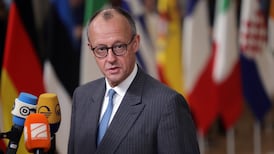Foreign policy: Europe's leaders will today urge Iran to co-operate quickly with proposals from the five permanent members of the UN Security Council and Germany to end the dispute over Tehran's nuclear-enrichment programme.
The United States has accused Iran of secretly developing nuclear weapons under cover of a civilian nuclear programme.
The package of proposals includes incentives to Iran to abandon nuclear research coupled with sanctions if it refuses. The proposals were put to the Iranian authorities by the EU high representative Javier Solana on June 6th. The initiative was agreed at a meeting between Mr Solana and the foreign ministers of France, Germany, the UK, China, Russia and the US in Vienna on June 1st.
In a draft declaration circulating last night, Iran is urged to "respond positively" to the "far-reaching initiative".
"These understandings offer the chance for a negotiated agreement with Iran based on a co-operative approach. The European Council gives its full support to the balanced approach incorporated in the Vienna understandings," reads the draft, expected to be passed by the 25 EU states today.
The council will also endorse a proposal to provide funding to the Palestinian people directly, thus bypassing the Hamas-dominated Palestinian Authority. This funding mechanism - devised by the "quartet" of the US, Russia, the EU and the UN - will fund social services, health, supplies of utilities, and social allowances.
In its declaration on the Middle East, the European Council will urge the Authority "to meet and implement the three principles of non-violence, recognition of Israel's right to exist, and acceptance of existing agreements and obligations".
It will call for early engagement between the Israeli prime minister and the president of the Palestinian Authority, and call on Israel to desist from "any action that threatens the viability of a two-state solution".
Of particular concern are settlement activities, the construction of the barrier on Palestinian land, and activities in and around East Jerusalem and the Jordan valley.
"The European Union will not recognise any change to the pre-1967 borders other than those agreed by both sides," it will say.
In relation to Iraq, the council will state its readiness to renew its engagement with the new Iraqi government and Iraqi citizens.
It will state its intention to support national reconciliation and Iraq's constitutional review process; to provide assistance with the rule of law and human rights; to support the delivery of basic services and promote job creation; to help to develop a "transparent administrative framework"; and to appoint an individual to head the European Commission's delegation in Iraq.








